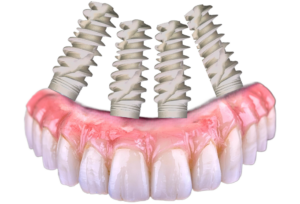Paying for ALL-ON-4 Implants
 Paying for All-On-4 dental implants can be overwhelming for many patients. On average, the price ranges from $20,000 to $35,000 per arch, depending on factors like the materials used and the case's complexity. For many, this investment may feel out of reach without financing options. Below, you will find information and recommendations from Dr. Hendriks.
Paying for All-On-4 dental implants can be overwhelming for many patients. On average, the price ranges from $20,000 to $35,000 per arch, depending on factors like the materials used and the case's complexity. For many, this investment may feel out of reach without financing options. Below, you will find information and recommendations from Dr. Hendriks.
Option One: Pay in full from savings.
- Although few people can do this, it can save you money in many dental offices. It costs the dentist less to accept cash than the fees associated with partnering with a third Party.
Option Two: Using a Home Equity Loan or Line of Credit
- If you own a home, tapping into your home equity can effectively finance All-on-4 implants. Home equity loans and lines of credit typically offer lower interest rates than personal loans or credit cards.
- Pros:
-
- Lower Interest Rates**: Rates are often significantly lower than unsecured loans.
- Tax Deductibility**: Sometimes, the interest on a home equity loan may be tax-deductible.
-
- Cons:
-
- Risk: Your home is collateral, meaning missed payments could result in foreclosure.
- Closing Costs: Some loans may require additional fees.
-
- Pros:
Option Three: Third-Party Financing
- Many dental practices partner with third-party financing companies that specialize in healthcare expenses. These companies offer plans tailored to patients' financial needs seeking elective procedures.
- Popular Third-Party Financing Providers:
- LendingClub: Personal loans with fixed monthly payments and competitive interest rates.
- Proceed Finance: Financing programs with flexible repayment terms and interest rates based on creditworthiness.
Dr. Hendriks Recommendations
- Before committing, understand the terms, including interest rates, fees, and repayment schedules.
- Checking with Your Bank or Credit Union. Your bank or credit union may offer financing solutions for healthcare expenses.
- Look into Insurance Coverage before starting treatment.
- Patients often are overly optimistic about how much their dental insurance will cover. Dental insurance isn't as easy to use as medical insurance for dental implants. While most insurance plans do not cover elective procedures like All-on-4 implants, some may partially cover associated costs, such as extractions, diagnostics (X-rays), and bone grafting.
- After consultation, specifically ask for a list of ADA Dental Codes within the treatment so the patient can call and verify what may or may not be covered and what documentation is required to qualify for coverage. Here is an example Treatment Plan with Dental Codes.

Paying for All-on-4 dental implants may seem daunting, but with careful planning and the right financing strategy, you can make this life-changing procedure affordable. Whether you opt for third-party financing, tap into home equity, or explore personal loan options through your bank, ensure that you fully understand the terms and commit to a repayment plan that fits your budget. A brighter, healthier smile is an investment worth making.




